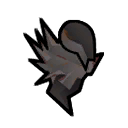Metalhorror
| This article relates to content added by Anomaly (DLC). Please note that it will not be present without the DLC enabled. |
| Spoiler warning: This page may contain details about the gameplay that might be considered spoilers. If you wish to enjoy the content first hand, you probably shouldn't continue reading beyond this point. |
Metalhorror
A horrific shifting mass of metal filaments, blades, and instruments. This metal is maintained and regenerated by a circulating dark fluid.
While dormant, fluid metalhorrors are hidden in a host body. They use their host to infect others, creating more metalhorrors. If detected or endangered, the metalhorror will form a jagged exoskeleton and cut its way out of the host's flesh.
An emerged metalhorror will eventually enter a low-energy hibernating state if left undisturbed.
Base Stats
- Type
- Entity
- Flammability
- 200%
Armor
- Armor - Sharp
- 50%
- Armor - Blunt
- 50%
- Armor - Heat
- 0%
Pawn Stats
- Combat Power
- 300
- Move Speed
- 5.5 c/s
- Health Scale
- 60% HP
- Body Size
- 1
- Mass
- 60 kg
- Filth Rate
- 1
- Life Expectancy
- 250 years
- Maturity Age
- 0.05 years (3 days)
- Juvenile Age
- 0.017 years (1 days)
- Comfortable Temp Range
- -100 °C – 250 °C (-148 °F – 482 °F)
Production
- Gestation Period
- 10 days
Melee Combat
- Attack 1
- Left blade
20 dmg (Cut)
30 % AP
2 second cooldown - Attack 2
- Left blade
20 dmg (Stab)
30 % AP
2 second cooldown - Attack 3
- Right blade
20 dmg (Cut)
30 % AP
2 second cooldown - Attack 4
- Right blade
20 dmg (Stab)
30 % AP
2 second cooldown - Attack 5
- Head
9 dmg (Blunt)
13 % AP
2 second cooldown
0.2 chance factor - Average DPS
- 5.52
The Metalhorror is an entity that can threaten your colony. It will infect your colonists one by one and burst out of them when it is ready to attack.
Occurrence
A Metalhorror infection generally begins as a hidden illness suffered by a single pawn, which is initiated by a storyteller event that targets a pawn with a valid infection pathway. Creepjoiners often come with drawbacks- one of which can be a metalhorror infection. Pre-infected pawns may arrive as guests or raiders.
During the monolith awakening, several mature metalhorrors will be spawned to defend each void structure. Additionally, once all void structures are defeated, a final group of metalhorrors will spawn around the void monolith.
Infection
| This section is a stub. You can help RimWorld Wiki by expanding it. Reason: Comprehensive list of transmission vectors. Attacks by entities, operations of all kinds by an infected doctor, tending by infected, food cooked by infected, food fed by infected doctor, and sleeping in the same bed with infected all reported. These, others, and existing vectors need verification and specifics. detection process - gray flesh, does the number to detect scale with researcher stats, what is the cooldown between gray flesh drops, etc. |
Metalhorrors are entities that infect humans, creating more of themselves as they do. It is possible to test pawns in order to find out who is hosting a Metalhorror. Upon detection, Metalhorrors will cut their way out of their hosts, leaving them wounded and bleeding. The death of their host will also cause them to emerge, even if they have not been detected first.
Metalhorrors can spread between colonists in various ways and cannot be detected before a gray flesh sample has been found.
The initial infection is activated by a miscellaneous storyteller event that chooses a random pawn with a valid infection pathway:
- Implantation before arrival. This applies to any pawn upon first spawning, except for your initial colonists and babies.
- During revenant hypnosis
- The melee attack of a shambler, fleshbeast, noctol, or sightstealer.
Metalhorror implantation events do not cause any letter to appear however gray flash appearing does.
Note that an infection pathway is not by any means guaranteed to become a full-fledged metalhorror infection. Pawns with infection pathways are not considered metalhorror hosts and will not spread the infection or generate gray flesh until and unless the metalhorror event triggers on them. An infection pathway expires after 30 days. If a metalhorror event triggers when no player controlled pawn possesses a valid infection pathway, the game will spawn a creepy joiner with a hidden metalhorror infection. It's highly recommended for players to quarantine new creepjoiners until they have been cleared for hidden infections. This is especially true if the creepy joiner spawned immediately after conducting a void provocation ritual.
Once a metalhorror infection is active, its host can secretly spread it to other pawns. Pawns infected this way gain the metalhorror infection immediately, rather than using the infection pathway system, and as such can start infecting other pawns from the moment they're infected. The following activities, when performed by an infectee, can spread a metalhorror infection:
| Infection event | Details | Infection chance per event |
|---|---|---|
| Sharing a bed |
|
100% |
| Performing surgery |
|
50% |
| Cooking a meal |
|
4% |
| Unnatural healing |
|
100% |
| Feeding patients |
|
30% |
Detailed Information to be cleaned up
| This section is suggested to be rewritten. Reason: Move this info into the correct sections of this page. You can help the RimWorld Wiki by improving it. |
There are two separate MetalHorror incidents. Both fire as Minor Threats.
MetalHorror Implantation fires on a random colonist that meets specific criteria such as recently joined colony or damaged by anomaly entities. Requires monolith level 1. Earliest day 30, can refire after 45 days, requires a colonist count of 4 and 300 Raid Points.
Creepy Joiner infected with metalhorrors: Requires monolith level 2, earlist day 10, and can refire every 60 days. Does not have a raid point nor colonist count requirement.
The first grey flesh appears 1.5 to 2.5 days after infection. When a gray flesh is to be dropped, there is an additional 1 to 12 hour delay. One gray flesh can drop every 3 to 10 days.
If half of your colonists are infected, the chance for metalhorrors to emerge will approach 100% after a few hours.
Summary
Contrary to other non-humanlike entities, they have three different life stages. They need 1 day to grow from larva to juvenile, and another two days to grow from a juvenile to a mature metalhorror.[Counts time inside?]
Metalhorrors do not leave behind corpses when killed, instead breaking down into a pile of 10-20 bioferrite, and occasionally 1 shard.[Chance?]
Containment
The metalhorror yields 4.4 bioferrite and 220W per day.
Combat
When attacked, metalhorrors only receive 25% of damage.
A metalhorror's attacks are identical to those of a scyther. Metalhorrors attack with a blade attached to each arm, dealing a massive 20 damage per blade. While they technically have a blunt Head attack, they will never use it unless their arms are destroyed. Even for brawlers with high melee skill, metalhorrors are extremely dangerous.[Maturity?]
| Melee Attacks | Damage Amount | Cooldown |
|---|---|---|
| Cut | 20 | 2.0 sec |
Unlike scythers, however, metalhorrors are highly flammable. They can be ignited very easily, and will disengage from combat while on fire. They can also be stunned by EMP.
Metalhorrors have a psychic sensitivity of 150%, making certain psycasts![]() more effective on them.
more effective on them.
Analysis
Once grey flesh is discovered, it is important to consider the pawns most likely to spread infections- Cooks, Doctors, and Wardens.
- Tracing infections from an infected cook is nigh-impossible. Consider switching the entire colony to eating nutrient paste which will prevent meals from being an infection vector until the metalhorrors have been rooted out.
- Doctors only spread infections while operating or feeding patients, which allows some guestimation as to who an infection might have been passed to. Do not schedule surgeries while a metalhorror infection is confirmed unless absolutely necessary. Pawns that have been downed and fed by doctors are susceptible to infection.
- Permanently downed prisoners (e.g those with legs removed), and recently acquired prisoners recovering from being downed in combat, are highly likely to be infected by an infected warden. Thankfully prisoners can be interrogated and their infections uncovered- even by infected wardens.
- Once a pawn has been confirmed as having an infection, if they share a bed or sleeping spot with another pawn, that other pawn is virtually guaranteed to be infected as well.
Detection
Paramedics ![]() can never become infected or lie about test results, so they can be used to test for Metalhorror infections safely.
can never become infected or lie about test results, so they can be used to test for Metalhorror infections safely.
If you don't have a paramedic, the following procedure can be done after studying 2 pieces of gray flesh:
- Have 2 doctors
- The instant you become aware of a Metalhorror infection, have doctor 1 check someone other than doctor 2
- If they find an infection, doctor 1 is clear.
- If they do not, have doctor 2 check the patient
- if they find an infection, doctor 1 is infected
- If they do not, have doctor 1 check again
- if doctor 1 finds an infection, doctor 2 is infected
- if doctor 1 does not, then either both doctors are clear or both are infected.
Alternately, the player can systematically order every colonist to repeatedly conduct surgical inspections on a sacrificial pawn such as a prisoner. Eventually, the sacrificial pawn will be infected with a metalhorror which will be detected with a subsequent examination.
In the event of total infection, a sufficient number of Mechanoids can safely clear out the revealed Metalhorrors, as long as the Mechanitors ![]() they are linked to are still alive.
they are linked to are still alive.
Prevention
Now as for preventing Metalhorrors from spreading premptively for the event of a infection, you can do the following
- set a zone forbidding pawns from accessing prisons, kitchens and hospitals, and set that zone onto any pawn who has less then 30 days in their record, especially creepjoiners, or pawns who were attacked by revenants or any of the entities described in the summary, and keep note of the days in their record and set the zone off once the pathway has expired.
- Cooks can still butcher and cook pemmican safely and doctors can be left to treat animals if you separate those into different rooms.
- Slaves do not have a record for time spent as a colonist so stats like time spent under a roof can be used as a rough estimate.
- Colonists that were in the colony for over a year have their record set as #.# making keep track of them more difficult, the combat log can be used instead albeit those are prone to being wiped. [When?]
- if a gray flesh event sets off then you can check any pawns who were assigned that zone.
- For lovers you can place another bed in their room and assign the suspect to it, preventing the sleeping alone moodlet. a bedroll may be used instead to prevent the room's space stat from being reduced.
- For combat encounters with entities you should ideally avoid having humans do melee combat, and let mechanoids and animals tank the hits instead.
Imprisoning Suspects such as Creepjoiners runs the risk of Prison Breaks and thus the possibility of outright losing them due to casualities or escaping so assigning a "Quarantine" zone to them until their drawback is identified can be a better alternative.
Gallery
Larva
Juvenile
Mature
Infection Vectors
Version history
- Anomaly DLC Release - Added.












